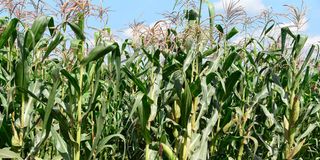
A maize farm.
Whenever we visited Mwai Kibaki in the 1980s, he would always enquire if it was raining in our neck of the woods.
I always wondered why the famed economic manager was very interested in that particular question.
Not yet in high school, I had not encountered the confusing science of economics, so, I chalked it up to the mysterious ways of older folk. It would turn out that rain is one of the shocks that finance ministers manage around.
As a graduate student in Sydney, I met a senior foreign affairs official who, years earlier, had been working as an expatriate at the Kenya Metrological Department (MET) in Dagoreti.
Over a meal, we discussed the working of the MET and I began to understand just how important it is for farmers and for economic management. Perhaps as many lads my age, I had never taken seriously the weather forecast on the evening news.
Later still, having started my professional work, a colleague and I were hired by the Ministry of Planning to study the impact of policy. We assessed whether Moi’s economic policy, as contained in various planning documents in the 90s, was actually having an effect on economic outcomes. The study concluded that rain had the biggest influence.
Achieving food security has been a stated if elusive goal, for all administrations. It is easy to see why. A population without food will soon revolt. And the food needs to be sufficient and nutritious. Our beloved republic is still far off this goal. The prevalence of stunting among children between 0 and 59 months is 17.6 per cent, while wasting is at 5 per cent. While these rates have declined, it is bad news that a large proportion of children are still not getting sufficient nutrition.
Third, the cost of food is a key component of inflation. And as we have seen, the escalating cost of living is a major concern for the population and is partly fueling the on-going Gen Z revolution. Fortunately for the regime, inflation is 4.3 per cent, down from a high of 9.23 per cent in February last year. But the regime is not out of the woods yet.
While good rains for the past 17 months have increased food supply, bringing down the cost of most foods, the traditional dry spell in January and February is not far off, and agriculture has remained rain fed.
The Kibaki administration begun efforts to transition the republic to irrigated agriculture. A long pipeline of irrigation projects was identified. Unfortunately, implementation has been plagued by the scourge of the country – corruption. With dams costing three to five times compared to similar projects in neighbouring countries, no significant irrigation schemes have come on stream. Rainfed food production will continue to yield significant variability even in the medium term.
Worse, economic growth was 5 per cent in the first quarter, slower than last year. Loans to private sector shrank 1 per cent in the same quarter. The second quarter numbers will no doubt be worse, particularly with the widespread civil unrest that engulfed the nation in May and June.
It is unlikely that the Supreme Court will save the finance act 2023. But even if it does, there is still a significant financing gap after the collapse of the finance bill 2024. Government finances will remain tight unless efforts to scale back expenditure bear fruit.
But there is short term hope for the policy makers. The MET released their forecast for the October-November-December (OND) short rains season last Wednesday. We can expect fair to good short rains in Nyanza, Western, and Central and North Rift Valley – about 21 counties. For the rest of the country, short rains will be fair to poor. As a result, we can expect fair food supply. That inflation should keep inflation below 5 per cent.
This is an opportunity for Treasury to stimulate the economy. Scaling back expenditure will reduce pressure to borrow. It is also an opportunity to reprofile current debt. Neither can be achieved with high interest rates. That is why experts expected the CBK to move decisively and reduce the CBK rate to about 6 per cent.
The reduction will increase credit to the private sector, while availing cheaper resources for government to reprofile current debt. Even after the record breaking Sh220.5 billion shillings infrastructure bond in June last year, government remained cash hungry. This, combined with doubts over the ability to meet the US$2 billion bullet payment for the Eurobond that was coming due, drove short term rates up sharply, to a peak of 16.68 per cent for the 91-day treasury bill in March this year. The rates have remained sticky, dropping only slightly to 15.78 per cent this week.
CBK may argue that high rates are necessary to attract forex, so that we don’t run out like Sri Lanka. But there are other options. The EAC remains our main trading partner, but this trade is settled in forex because the long waited monetary union is yet to kick off. Some analysts accuse Kenya of dragging its feet, because the balance of regional trade is in our favor. Starting the monetary union should be a big priority, as the additional economic activity outweighs the forex loss. It will be interesting to see the government’s stance now that Kenya is eyeing the AUC chairmanship. Strong regional integration is the cornerstone of the AU strategy.
Whatever policy choices the economic managers make, one thing is clear. An urgent stimulus is necessary. Low inflation provides the opportunity to get it done.
@NdirituMuriithi is an economist and partner at Ecocapp Capital







